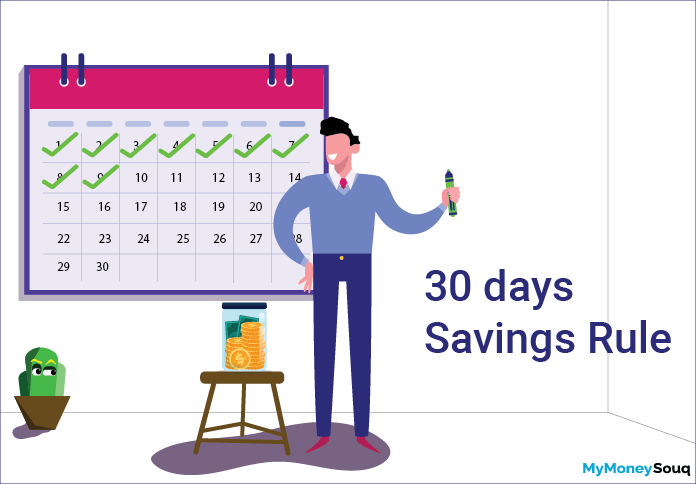We all struggle to save money (most of us do). It is said that saving is a habit that is cultivated by commitment and a never-say-die attitude. However, no matter how hard we try, unexpected expenses have a way of finding us and breaking our commitment to savings, don’t they? Hence, we need a plan or a set of rules to live by so that we never falter from our commitment to savings. One such rule is the widely popular 30-day Savings Rule. In this article, we will talk about the benefits of this rule, how it works, and why it is a great way to start creating a savings habit.
Check: Reasons why one should have a Savings Account
What is the 30-Day Savings Rule?
Whenever you want to make an impulsive purchase, STOP! Tell yourself that you will buy the said product after 30 days and deposit the amount of the product into your savings account. After the 30-day period is over if you still feel like buying it, then go ahead. If not, then you would have saved up some extra money. Over time, this rule can help you cultivate the habit of savings.
In order to understand the efficiency of the 30-day rule, it is important to understand the 30-day impulse spending rule.
30-Day Impulse Spending Rule
We all have made impulsive purchases some time in our lives. We are sure you remember that feeling when you walk into a mall and see something that you have to buy. You don’t stop to think if you really need it or if it is worth it. There is something about the product that makes you want to buy it immediately. Every time you buy something based on emotions rather than careful financial consideration, it is an impulse purchase.
We are all guilty of this. However, these impulse purchases can throw your budget off the rails and even increase your debt (if you use credit cards for shopping). In order to curb these purchases and help save money, the 30-day savings rule was created.
Also, check: Why can’t you spend all the money? – Reasons to save money
By delaying the purchase for 30 days, you give yourself time to get over the emotions that led you to make the purchase and assess if it is a NEED or a WANT.
How to decide between a NEED and a WANT?

While budgeting your expenses, it is important to define needs and wants and allocate funds accordingly. A NEED is ideally something that you cannot live without whereas a WANT can be avoided. After 30 days, if you feel that you NEED the product, then buy it. On the other hand, if you think that you WANT the product, then ensure that you budget for it before buying it.
We are not saying that you have to curb your desires to save money. All you must do is ensure that all purchases are well thought-over. Chances are, that if you put aside 10 products using the 30-day rule, then you would at least refrain from buying five. That is money saved!
Working of 30-Day Savings Rule
The moment you decide to start following the 30-day savings rule, start carrying post-it notes with you. Whenever you are out shopping (online or offline), keep the post-it handy. Whenever you think that you are buying something that you had not planned for, get the post-it out and write the name of the product, price, the place where you found it, the date, and the reason why you wanted to buy it. Tell yourself that you will wait 30 days, as decided, and come back for it. Once home, transfer or deposit an amount equal to the price of the product in a bank account.
Stick the post-it on your refrigerator or any other place where you can see it every day. Also, ensure that the money that you have set aside for this purchase is not spent on anything else (except emergencies).
Go about your routine and every time you see the post-it, think about the product and if you still want to buy it. Feel comfort in the fact that all you need to do is go and buy since you already have the money set aside for it.
By the end of the month, you might not feel like buying the product at all!
Why? –You worked hard to keep the money aside and not spend it on anything else, did you? That’s exactly what savings are about. The effort you put in keeping the money safe will make it difficult for you to spend it on something that is not absolutely necessary. Over a period of time, this rule can help you cultivate the habit of savings by showing you the benefits of having surplus funds at all times without giving in to the urge of spending it on something irrelevant.
Create your own 30-Day Challenges
While you are implementing the 30-day savings rule and curbing all impulse purchases, you can also create some fun 30-day challenges to help you save as much money as you can. Here are some examples:
Not spare the change challenge

One of the best ways to save more money is to save as frequently as possible. Every time you go out and buy something (for necessities or luxury), save a small amount of money. The best way to do this is to have a jar at home where you put all the change once you are back home. We know that this sounds childish and might not seem like a lot, but trust us, over time this can add up to a reasonable sum. Try it for thirty days and surprise yourself!
Not dine out over the next month challenge

Have you ever wondered how much you spend on eating out every day? Many people don’t carry lunch boxes with them and either eat at the office canteen or a local restaurant. That’s an expense! Also, many others have a habit of going out with colleagues for dinners on working days and with friends/family on weekends. That’s a seven-day dining out habit. Spare some thought for the amount of money you could save if you could get rid of this habit?
Dining out doesn’t seem to cost much since each meal is not a seven-course meal. However, if you add up the small pennies, you will be shocked to see the final amount. For example, AED 15 coffee in the morning + AED 30 mini meal + AED 15 coffee in the evening + AED 20 snack in the evening adds up to AED 80 per day. Over the course of the month (20 working days), that’s AED 1600!
Take the no-dining-out challenge for a month along with the 30-day savings rule. You will be happy to see the savings at the end of the month. Also, this challenge will give you an opportunity to get creative in the kitchen!
Save AED 300 in a month challenge

This can be the first step towards becoming a regular saver. On the first day of the month write down a number on a piece of paper and put it up in your room. The number should be the amount of savings you plan to do in the month. It can be AED 500 as suggested by us or even higher or lower as you deem fit. Just keep it high enough for it to be challenging and the amount to mean something at the end of the month.
As the month progresses, decide if you want to save equal amounts every day, every week, or just keep the amount aside and plan the rest of your expenses accordingly. You can also make a list of your current expenses and figure out ways to cut or reduce costs somewhere so that you can free up some funds. You might even want to take up small gigs like writing an article, designing a logo, walking a dog, etc. for additional income to help reach your goal. Get creative and enjoy the process.
Related: Hobbies that can earn money in your bad times
Summing Up
The 30-day challenge can induce the importance of refraining from expenses that are not essential and realizing the amount of effort it takes to have money but not spend it. Remember, a financially secure future can be based on savings alone. The sooner you start, the better chances you have at creating a reasonable corpus to have an independent life when you get older.
One of the main reasons people don’t save money is that they never start. They think about it a lot but never start. Even those who do, give up after one or two failed attempts. Understand that savings is integral to your future and leave no stone unturned to cultivate the habit of saving money. We hope our article motivated you enough to start saving money. Stop procrastinating and start saving your money from your impulse purchases – implement the 30-day savings rule today!
About the author
Nikitha is a Senior Analyst at MyMoneySouq.com. She has been writing about personal finance, credit cards, mortgage, and other personal finance products in the UAE. Her work on Mortgage loans has been featured by the GulfNews and other popular Financial Blogs in the UAE.


